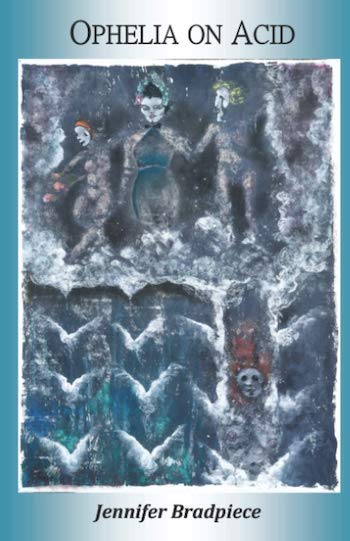Ophelia on Acid is rich with candid and uncanny poems. Pulling no punches Jennifer Bradpiece wears the title painling like reverse-armor and with all the tenderness of soft skin, guides the reader through the altered reality that manifests in the wake of daily pain. The rituals—the secrets—the haunting truth of pain: resonate loudly in these pages.
Through Ophelia on Acid Bradpiece establishes herself in the emerging tradition of disability poetics, deriving forms from her experiences with doctors, the medical system, and from having to explain and reexplain that the pain is real. These poems occupy space in conversation with anthologies like, Beauty is a Verb. Disability poetics has become a flourishing artform though barriers remain for disabled writers. Submitting to publications can itself be an insurmountable task. For so many reasons I consider Ophelia on Acid a true gift to hold in my hands—dredged up from unknown depths, this book is my elixir on days I must soothe my own pains. This is a book I keep returning to as I see myself and others with pain more clearly in this river of words. In the poem, “You Ask Me Why I Wear Bright Colors,” pain is painted in all its vividness and the pervasive myth of a passive, pallid, or pale patient are obliterated. Instead the reader is invited to, “[…] place your head to my chest/and listen: the sound inside/is a peacock’s cry—strangled.” The poem that follows, “The Broken Bone,” reveals just how such a cry draws breath:
My eleventh year a horse threw me like a shoe:
unlaced me where pleasure would hinge.
The broken bone grew into a bad fist.
It will clench cold while I am wrapped around a lover.
It will stab into its crescent socket
as I hurry downstairs.
My youth will buckle here.
These images kick at the reader, kick through to the heart as they make room for this new tale of Ophelia (that’s right Shakespear, scoot over, time to make room for more womyn on the page!). This is Bradpieces’ world, where lines walk the tightrope between pleasure and pain: the body being our threshold for sensory input. This liminal space is traversed in many ways throughout Ophelia on Acid, in lines like, “I don’t know whose bones flatten the bed,/whose nerves twitch like strobes, whose/skin I’m waking up in” (“Re-Animation Aubade”) she describes the shock of waking up everyday and the harsh bewilderment that comes from debilitating-chronic pain. The overwhelmed brain can only navigate the choppy waters of sensory overload so well. It is this vulnerability that allows for intimate and sensual moments of trust:
My numb hand begins to register
its place in yours. Slowly you work up
the bones of my hand with your
fingertips and palms.
Reconstruct me.
Build me up from the twisted
pillows and haul me out
the grotesque halls of dream.
Roll out my shoulder muscles.
Carefully pack me in ice,
a frozen Persephone,
guiding the ship of my exanimate
vessel back to land.
(“Re-Animation Aubade”)
This collection, much like C.R. Grimmer’s, The Lyme Letters, is a form of memoir that chronicles and portraits the author’s experiences with disability in America. The added vulnerability of having to navigate a system of medical care that was established through the cis-white-male gaze is clear in these disability narratives derived from queer and female bodied perspectives. This has complicated healthcare for so many folx “othered” in literary canon (authors and characters) and throughout Western history. The need to tell one’s own story in this context becomes clear in poems such as, “The Thing Is,” where the narrator is second guessed by doctors who think lying about prognosis is a kindness when faced with these symptoms, but Bradpiece knows the truth:
The thing is, the truth is
I am often eighty in a
forty year old body.
(Doctors say:
“Well, you won’t
feel any worse
when you’re eighty.”)
The truth is
each year, I do—
each year, a something new.
So I know the bait
moves up ahead.
An exhaustion accumulates
filling in the breathy gaps.
The bridges between body and mind, life and death, pain and pleasure, consciousness and senselessness, are all floated under by this new Ophelia. She is not afraid to swim deeply in these waters even as she knows the eventual cost, it is not for her to worry. With honesty and power Bradpiece instead instructs her readers, “These skins are our songs./Let’s put our ears/to every pore and use/the pain for kindling” (“Life Lines”). Sage advice for any of us still breathing on this planet, in these times:
ride on the waves
which give you strength—
widening like an
unexpected smile,
like arms growing
round enough to hold others.
(“The Release”)
—“round enough to hold” Ophelia on Acid and its harried wisdom. This is a ruthless tale of feminine archetypes, figures too often given little room on the stage, page, or anywhere else as it turns out. This book is an act of defiance to that tradition, rather it is a one-woman parade—a monologue for the missing characters. This firsthand account, this selfless autobiography, morphs easily as water, as luscious as illusion, with mirror-depths and smoke-filled mouths. If you have an appetite for such delights, I welcome you, step into the river with Bradpiece, and take this dip in Ophelia on Acid.

